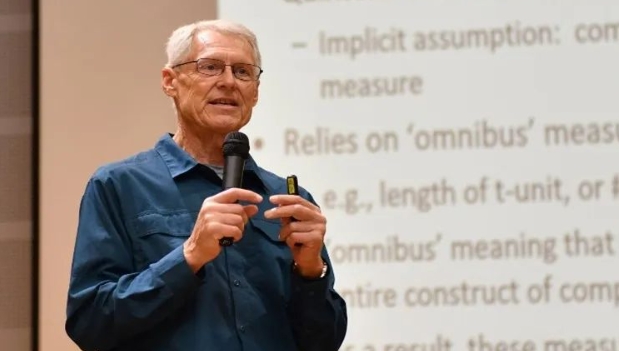Research Seminar Series
What is a register? Accounting for linguistic and situational variation across, within, and outside of textual varieties

Speaker: Douglas Biber
Northern Arizona University, USA.
Date: July 03, 2024
Time: 11:00-12:30 (GMT+08:00) 中国标准时间 - 北京
Zoom Meeting ID: 784 288 9659
Bio note: Douglas Biber is Regents' Professor Emeritus (Applied Linguistics) at Northern Arizona University. His research efforts have focused on corpus linguistics, English grammar, and register variation (in English and cross-linguistic; synchronic and diachronic). He has published over 260 research articles and 25 books and monographs, including primary research studies as well as textbooks. He is widely known for his work on the corpus-based Grammar of Spoken and Written English (1999/2021) and for the development of ‘Multi-Dimensional Analysis’ (a research approach for the study of register variation), described in earlier books published by Cambridge University Press (e.g., 1988, 1995, 2009/2019, 2018). More recently, he co-authored a textbook on Register, Genre, and Style [2nd edition] (Cambridge, 2019), co-edited the Cambridge Handbook of English Corpus Linguistics (2015), and co-authored research monographs on grammatical complexity in written academic English (Cambridge, 2016; Routledge 2022), register variation on the web (Cambridge, 2018), and principles of corpus design and evaluation (Cambridge 2022).
Abstract
Dozens of studies of register variation, especially in the Multi-Dimensional tradition, have established the importance of systematic linguistic differences among registers. These differences have been interpreted relative to the functional correspondence between situation/context and language use. However, previous conceptualizations of register cannot adequately account for empirical findings which have revealed (i) situational and linguistic variation between texts within registers and (ii) texts that do not belong to a register. We propose an alternative conceptualization in which registers are culturally-recognized categories, as opposed to scientifically-defined categories. This allows us to describe and compare registers for their typical characteristics as well as the variation among texts within register categories. It also allows us to account for the functional correspondence of texts that exist outside of register categories.
Organizer: Muhammad Afzaal
Associate Professor
Institute of Corpus Studies and Applications
Shanghai International Studies University, China
Afzaal@shisu.edu.cn

